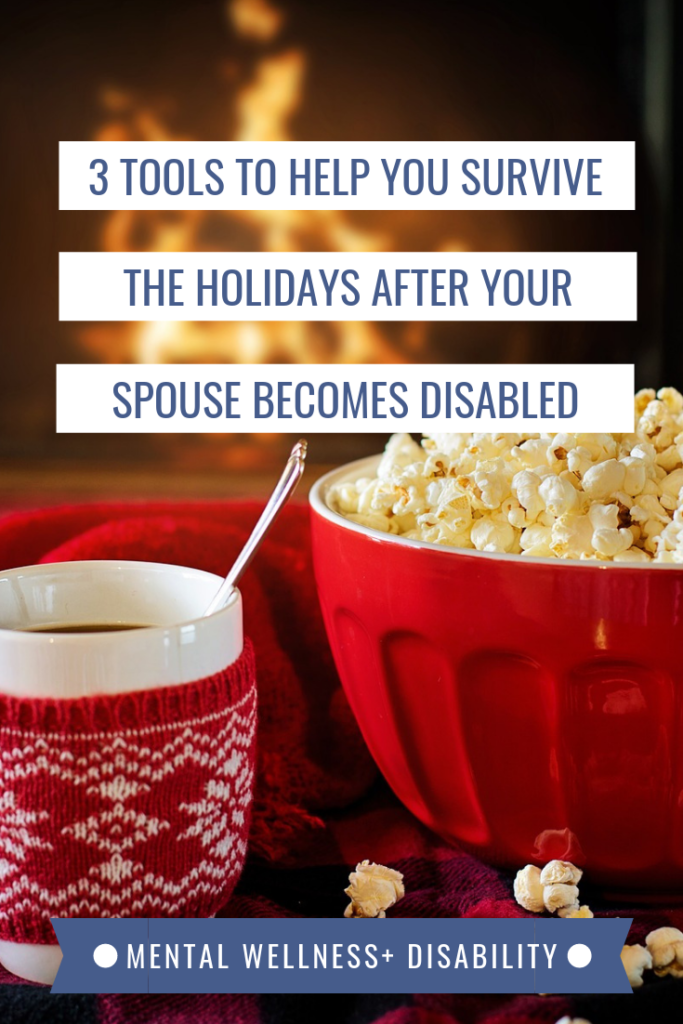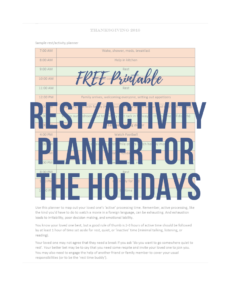After your partner acquires a disability, routine becomes your friend. Out of the ordinary days can leave you and your spouse both feeling irritable and exhausted.
Sadly, that’s true even on special days like Thanksgiving or other holidays.
Many of my counseling clients who are spousal caregivers have questioned if they should celebrate the holidays at all. It’s understandable why they wonder if the holidays are even worth it.
Take heart.
You and your spouse can both enjoy a peaceful holiday, one that leaves you both feeling grateful and loved. Here are the tools I share with my counseling clients who worry that they won’t survive the holidays because of their spouse’s disability.

A rest/activity calendar
If your spouse has experienced a stroke, Traumatic Brain Injury, or other major medical event, they need rest.
Their memory, understanding of what’s going on, and mood are all best when they’ve had plenty of ‘down time’. But, when your partner is overstimulated and overtired? They may seem to lose skills they’ve previously mastered. They might have trouble concentrating and may even be prone to irritation and angry outbursts.
The trouble is, if you wait until you see these outward signs of tiredness to suggest taking a rest, it’s probably already too late.
That’s why I recommend using a simple visual to help you, the care-giving partner, plan out the active versus rest times of the day. Do this well in advance of the holiday to ensure that you’re prepared on the day.
 Here’s a free download of a very simple visual schedule you can use to map out the holiday. The first page is a sample schedule, and the second page is blank for you to use.
Here’s a free download of a very simple visual schedule you can use to map out the holiday. The first page is a sample schedule, and the second page is blank for you to use.
As you can see on the sample schedule, I like to highlight rest versus active times in different colors. Doing this ahead of time clues you in to times of day that your spouse may be most prone to over-activity.
A rest/activity planner can also help you to avoid power struggles
Suppose you see that your spouse will probably need to take a rest right in the middle of your family’s Thanksgiving dinner.
Knowing this ahead of time, you can prepare and proactively help your spouse get the rest they need.
You might adjust the timing of the meal so that there’s a natural rest time built in between courses.
Or, you could employ a family member to help you encourage your partner to rest if you know they won’t listen to you. Maybe a family member can ask your partner to help settle a toddler down for a nap by resting with them. Or another family member can say that they are tired and invite your partner to sneak away for a quick nap.
Recognizing ahead of time that your spouse will need to rest in the middle of a holiday allows you go solicit help from friends and family who want to help you make the day go as smoothly as possible.
A ‘how you can help’ list
Once your spouse becomes disabled, people are constantly asking ‘how I can I help?’. If you’re anything like my clients who are caregivers, you struggle to answer this question.
And I get it.
You feel guilty asking others to change for you. There’s anxiety, too, that they’ll think you’re asking for too much. You fear that your spouse will still get irritated despite the extra care others have shown. Then people will wonder if the both of you are worth the trouble they went to.
Take a moment to consider if roles were reversed. How would you feel if you had a family member who had a newly disabled spouse? I imagine you’d want to support them. If you asked to help and they gave you suggestions for how to do just that, how would that feel? Probably you would feel grateful that they’d given you explicit ways that you could be helpful.
When I ask clients to consider this scenario, they almost always agree that their family does want to be helpful.
So, before anyone even asks if they can help, jot down a list of things they can do that will be most helpful.
It might be:
- Please put John in the seat with the easiest access to the bathroom at dinner.
- Please make sure I’m sitting on John’s left side at dinner, so that I can discreetly wipe any crumbs he doesn’t feel on his face.
- Give me a five-minute warning before you serve the buffet. I’ll use that time to make John a plate and have time to cut his food. Then he won’t be embarrassed that I’m cutting for him when we all sit down to eat.
- Let us use the master bathroom to change John’s colostomy bag. That way we won’t disrupt people who need to use the hallway half-bath.
And so on.
If you’re still struggling with guilt, you can limit yourself to only 3 things.
The point is that you have the list ready to go ahead of when they ask. That way, when they ask, you don’t feel overwhelmed, or anxious, or guilty. You get to feel prepared.
You knew that they were going to ask this, and you were considerate enough to think through your answer ahead of time. Now all that’s left is to share with your family your list of ways that they can help you and your partner enjoy the day. Because I promise, that’s truly what they want you to do.
A proactive approach to changes in traditions
Our family traditions are part of what make the holidays so special. That’s why it can be especially tough if your partner’s disability means that a tradition can’t take place, or will need to change.
I always encourage my counseling clients who are care-giving partners to think through their family traditions.
I once worked with a woman who was dreading Thanksgiving. Her husband had always carved the turkey. But, he’d recently had a stroke, and now he couldn’t use the knife to slice the turkey. She described feeling hopeless for him, knowing he’d have to give up this ritual that previously was so important in their family.
Ultimately, she and her husband talked through this. They grieved together over the things that had changed for them both. They also decided that, even though the change had to happen, they got to decide how it happened.
Together they wrapped the carving knife in beautiful packaging and made a little presentation to their eldest son, telling him that he’d just been promoted to turkey carver. Their new tradition also included that my client’s husband would always get the first piece of turkey!
I loved that they were authentic in allowing their grief, but that they also allowed humor to be part of their changing tradition.
Changing tradition to minimize power struggle
I had another client who was dreading the dessert course of Thanksgiving dinner. Her husband had also experienced a stroke earlier in the year. She described that he often got ‘lazy’ in his eating as he got tired. My client was anxious as she talked about how she imagined the dessert course going.
“He’s going to take the biggest piece of pumpkin pie. But he’s going to be too lazy to cut it properly or to use his fork correctly. It’s going to get all over him and probably all over the floor by the end of it. I could jump in to help him, but he’ll say I’m babying him. If I don’t help him, I’ll just feel embarrassed for him. I feel like it’s a no-win situation.”
But, with a little creative thinking, my client landed on a idea that was win-win for everyone.
Rather than just set out large slices of pumpkin pie, my client made pumpkin pie bites. She took a small, round biscuit cutter and made individual, bite-size, no fork necessary pieces of pumpkin pie. Her husband was able to pick up a piece and pop it into his mouth with no trouble.
With a little creative to change to their usual tradition, he still got pumpkin pie and she avoided the power struggle she was dreading.
I hope that you have found helpful suggestions here if you are caring for a partner who has recently acquired a disability.
Of course, it’s understandable that some days will just be harder than others.
The holidays can feel like a perfect storm for anxiety, guilt, and sadness to deepen. Some days you get lost in reflecting on how different things are than how they were…and how different they are than how you thought they would be.
If you find that it’s hard to find the good some days, know that you’re not alone. Many people who are caring for a disabled spouse feel the same way.


